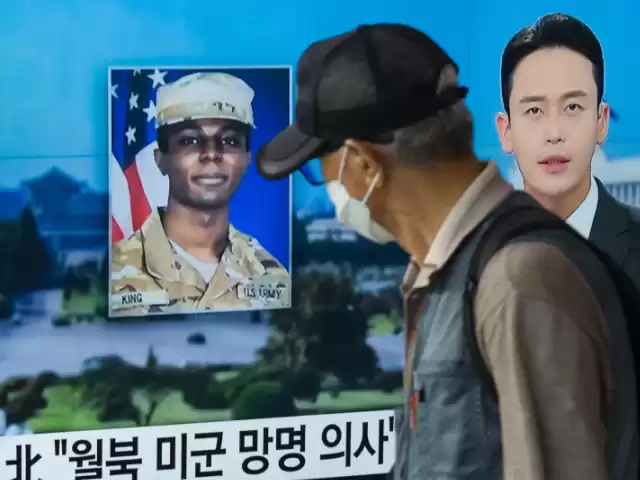Biden Thanks China for Helping Free US Soldier Travis King from North Korea
President Biden's National Security Adviser, Jake Sullivan, thanked China for helping return a U.S. soldier from North Korea.
President Joe Biden's National Security Adviser, Jake Sullivan, expressed gratitude towards China for their alleged assistance in bringing Private 2nd Class Travis King back to the United States from North Korea. This acknowledgment suggests that the United States sought the help of an adversarial communist government to rescue one of its soldiers.
King had been in the custody of the repressive and unpredictable North Korean government since he went missing on July 18. He was originally scheduled to fly out of South Korea's Incheon Airport that day but instead decided to join a tour of the Demilitarized Zone (DMZ) between the two Koreas. While on the tour, he ran across the border into North Korea and hadn't been seen until recently when American officials confirmed his return to American custody.
An eyewitness from the tour group recounted the incident, stating that King simply laughed and ran in between some buildings.
On Wednesday, North Korean state media announced that they had chosen to "expel" King from the country after conducting an investigation into the circumstances of his entry. They claimed that he had entered illegally and cited his alleged animosity towards systemic racism in the United States as the reason behind his actions. The Korean Central News Agency (KCNA), the main government media outlet, reiterated these claims, stating that King had "harbored ill feeling against inhuman maltreatment and racial discrimination within the U.S. Army and was disillusioned about the unequal U.S. society."
According to reports, King is currently in transit to the United States after arriving in South Korea on Wednesday. The South Korean outlet Yonhap reported this information.
Sullivan released a statement on Wednesday confirming King's return and expressing gratitude towards the Chinese Communist Party. He thanked the interagency team that worked tirelessly to ensure King's well-being and also extended appreciation to the government of Sweden for their diplomatic role and the government of China for assisting in facilitating King's transit.
Chinese Foreign Ministry spokeswoman Mao Ning acknowledged Sullivan's statement but did not provide any specific details about China's involvement. She simply stated that China had provided necessary assistance at the request of both North Korea and the United States out of humanitarianism.
Yonhap, citing the U.S. State Department, reported that North Korea expelled King through a roundabout journey into China, rather than directly sending him across the inter-Korean border. King arrived in the Chinese border city of Dandong and then flew to another Chinese city, Shenyang, before finally reaching Osan Air Base in South Korea. From there, he was transferred to the Department of Defense before departing for the U.S.
The North Korean government's decision to deport King without incident is unprecedented, although it is not uncommon for individuals to defect to North Korea. According to the Korea JoongAng Daily, at least six other American soldiers have crossed into North Korea from the South since 1962. These soldiers sought refuge in the communist country and were kept as hostages and propaganda tools by the North Korean regime.
North Korea has a history of detaining civilian Americans to use as bargaining chips with the United States. The case of Otto Warmbier, who was arrested in Pyongyang and later died after alleged torture, is a notable example of this tactic.
At this time, American officials have not provided any details about King's current condition or whether he experienced any mistreatment while in North Korean custody.
Experts speculate that King's swift expulsion from North Korea indicates that the regime did not see him as having much diplomatic value. Cheong Seong-chang, an analyst at the Sejong Institute, suggests that King simply wasn't worth keeping due to the costs associated with providing for him and assigning him guards and translators, especially considering he wouldn't provide meaningful U.S. military intelligence.
Prior to his entry into North Korea, King had legal troubles in South Korea, including a two-month prison sentence for assault against Korean citizens. Court documents revealed that he was arrested after getting into a drunken altercation at a Seoul club and punching a South Korean national multiple times. He was also arrested on a separate occasion for assaulting another person and being aggressive towards the victim and police officers.
It is unclear whether King would have faced disciplinary action within the U.S. military upon his planned return to Texas in July before he decided to run into North Korea.
American officials reiterated in July that King's decision to enter North Korea was his own and not done under any orders from the U.S. government.
The North Korean government took almost a month to publicly confirm that they had custody of King. They stated that he deliberately intruded into the area on the North Korean side of the Military Demarcation Line.
At present, American officials have not verified any of the North Korean claims about King's attitudes towards racial discrimination. Additionally, King has not made any public appearances or statements.












Comments on Biden Thanks China for Helping Free US Soldier Travis King from North Korea